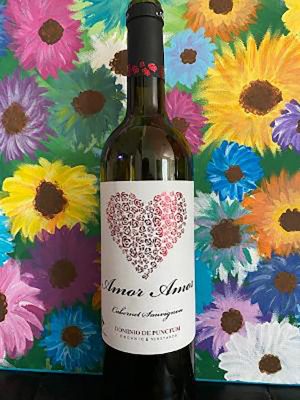
By Rick Riozza
Each year now, wine lovers are coming to realize the benefits of organic wine. Organic wine accounts for 3.6 % of global wine consumption. (In England, it’s even higher at over 5% and by 2022 the Brits estimate that number to increase to 9% of total wine consumption—why are they on board so quick?). Anyway—it’s clear that oenophiles out there are buying into the organic mindset.
Generally speaking, organic wine grapes are much healthier and therefore produce heartier skins and higher concentrations of all of which is good for you: anthocyanins and antioxidants, including polyphenols and cardio-friendly resveratrol. Organic grapes are not sprayed with harmful chemical pesticides, fertilizers and herbicides. As a result, organic wine is a more natural and cleaner product to consume.
Organic wine has fewer sulfites: sulfur dioxide is a preservative that’s widely used in winemaking owing to its antibacterial properties. It’s generally harmless to consume sulfites unless you have severe asthma or lack the particular enzymes needed to break down sulphites in your body.
Not a whole bunch, but some wine drinkers experience allergic reactions to sulfites in their wine such as rash, hives, cramps and blotchy skin. In the wine aisle, I hear from folks all the time that they get headaches from the sulfites; that could be true, but from what I hear from health professionals, quite often it’s the pesticides, herbicides, and harmful fertilizers that can get in your head—so to speak.
The amount of sulphites in wine is highly regulated around the world. Any bottle of wine having more than ten parts per million (ppm) must include on the label “contains sulphites.” European wine may contain up to 210 ppm sulphites, while the American wines have an upper limit of 350 ppm.
Also, organic wine has less added sugar—and that’s a good thing any which way you look. Indeed, organic wines are free of additives such as refined sugar, and fining and clarification agents.
And, organic winemaking practices avoid using chemicals and promote biodiversity in our environment. The use of chemicals can spoil the PH balance of the soil, kill environmentally beneficial insects and weeds, and pollute groundwater and local waterways. So the bottom line for a responsible world is: Organic wine is natural, sustainable and much more eco-friendly compared to conventional wine.
Enter now Brian Cuddy, owner of The Organic Cellar, whose offices and warehouse are close by in Laguna Hills. He is a favorite of this column because he goes out and discovers wonderful biodynamic wines from all over the world and brings them home for us to consider while keeping the costs as low as possible.
The Organic Cellar was founded in 2009 and Brian immediately began curating a portfolio of the best organic, vegan, and biodynamic wines he could find, beginning with the network of farmers, growers, and winemakers he had befriended throughout Italy. He was able to combine his love for wine, passion for sustainable and organic farming, and the amazing opportunity to educate wine drinkers on the benefits of choosing to drink organic.
The Organic Cellar now proudly imports and distributes quality, highly-scored organic, natural, vegan, and biodynamic wines to many popular restaurants and wine retailers in Southern California and beyond.
“The Wine from La Mancha”: Playing off the musical “Man from La Mancha”, that line was almost the title of this piece; but you know how I like quippy column titles so I went with the one you read at the top.
But situated in the town of Las Pedroñeras and at the north end of La Mancha, the main Spanish wine region, Dominio de Punctum distinguishes itself by its exclusive Estate and Winery production and the singularity of its organic and biodynamic wines.
 And of course St. Valentine’s Day doesn’t have a monopoly on the idea of love. Dominio de Punctum’s recent release of the Spanish Cabernet Sauvignon, naming the wine, Amor Amor, ($26) is a wonderfully lovely wine through and through.
And of course St. Valentine’s Day doesn’t have a monopoly on the idea of love. Dominio de Punctum’s recent release of the Spanish Cabernet Sauvignon, naming the wine, Amor Amor, ($26) is a wonderfully lovely wine through and through.
The Spanish Cab is a very impressive quaff. All you die-hard Cal Cab fans, who still have the wherewithal to try new stuff, this lighter-bodied version of your favorite grape should impress. It’s robed with beautiful colors of deep red violet, and delivers aromas of cherry, red berries, blueberry and cassis, coffee & spice.
On the palate, you’ve got classic Cabernet flavors with hints of chocolate & cherries. It’s well balanced with nice easy tannins leading to a long, rich finish. At an alcohol level of 13.5%, it’s a perfect match for all kinds of meats and roasted vegetables, and, capable to pour alongside appetizers.
As you would expect, this wine is made with estate-grown grapes from organic farming, free of chemical pesticides and fertilizers, using biodynamic practices to in order to improve the soil structure and enhance the natural cycle of the vines achieving the highest quality grapes.
The Amor Amor Cab was a hit accompanying my porterhouse steak, which was topped with crimini mushrooms along with a wedge salad and blue cheese crumbles. The food and wine combo was so pleasant that it gave us pause to reflect on the joys and blessings we continually receive from the love of God. Cheers!
If you are looking to buy some organic wine with ease online, check out the Organic Cellars’ portfolio and go to www.TheOrganicCellar.com.











































